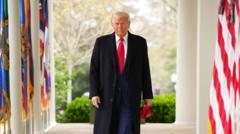With a high-stakes game of tariffs afoot, nations are scrambling to adapt as Trump's economic strategy raises questions about its impact on the global market.**
Trump’s Tariff Tensions: A Global Economic Gamble**

Trump’s Tariff Tensions: A Global Economic Gamble**
As Donald Trump’s new tariffs loom, the world watches anxiously, with mixed reactions from global leaders and investors.**
As Donald Trump prepares to implement new tariffs, a precarious game of economic chicken unfolds, leaving global markets and leaders on edge. Some countries labeled as "worst offenders" are hastily attempting to negotiate with the White House to avoid what could be a catastrophic economic fallout, while China adopts a defiant stance of retaliation.
Despite some Republican allies expressing concern about his aggressive tariff plans, Trump remains resolute. When asked about potential market consequences, he dismissed the inquiry as "stupid," indicating a firm commitment to his approach. Investors and political figures are left to ponder whether this is a mere bargaining tactic or part of a broader strategy to reshape global trade and America's role within it.
Israeli Prime Minister Benjamin Netanyahu, the first leader to meet Trump post-announcement, promised to eliminate trade barriers and reduce their surplus with the US, presenting Israel as a model for others. Similarly, Japan's Prime Minister Shigeru Ishiba reached out to discuss alignment with Trump's vision, while Europe's Ursula von der Leyen expressed a willingness to negotiate tariff reductions on industrial goods, garnering Trump’s cautious approval—though he deemed it insufficient.
In stark contrast, China has sharply increased its tariffs in direct response to Trump's proposed hikes, further escalating tensions. Trump's administration sees China's retaliation as a bad faith move, with officials stating that over 50 nations have positively responded to the president's trade initiatives.
As the stock market reacted negatively to these developments, even Trump's financial backers voiced their opposition to the tariff strategies. Monday’s speculation around a possible delay led to temporary market gains, but Trump's insistence on moving forward quashed any hopes for reprieve. His top trade adviser, Peter Navarro, emphasized that this is not merely a negotiation but the beginning of a more significant transformation in trade relations.
One theory is that Trump aims to compel trading partners to devalue the US dollar, potentially making American exports more competitive on a global scale. While this strategy is debated among economists, the actual ramifications of Trump's tariff approach remain unclear.
As America heads toward the critical tariff deadline, the ambiguity surrounding Trump's economic strategy leaves the world bracing for potential upheaval, with officials and investors alike searching for clarity in the tumultuous landscape he has created.




















